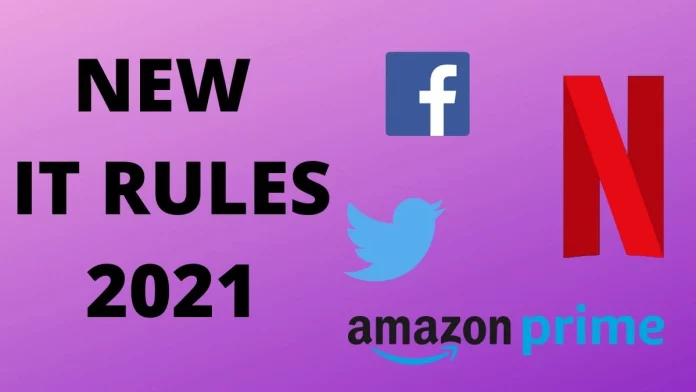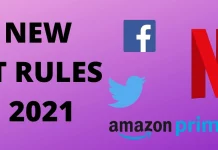This article is written by Harman Juneja, a student of Dr. B.R. Ambedkar National Law University, Rai, Sonepat. The article talks about the new rules of the IT act and discusses the issues related to it.
Table of Contents
Introduction
In the digital age, the general public relies on social media for news, entertainment, and so on. People’s reliance on social media is extremely harmful at this time because there is a great possibility of abuse. As a result, there was a perceived need for severe standards governing any sort of information transfer via intermediaries. In response, the Ministry of Electronics and Information Technology published for public comment the draught Information Technology (Intermediary Guideline) Rules, 2018. As a result, the Government issued the Information Technology (Intermediary Guidelines and Digital Media Ethics Code) Rules, 2021 on February 25th of this year.
Information Technology Rules, 2021
Following years of deliberations and arguments, the Ministry of Electronics and Information Technology, Government of India, has published new guidelines for monitoring social media digital media platforms under the Information Technology Act, 2000 (“IT Act”). The new laws, known as the Information Technology (Intermediary Guidelines and Digital Media Ethics Code) Rules, 2021 (“Intermediary Guidelines”), aim to serve a dual purpose, among other things. These purposes are :
- Making social media platforms (such as Facebook, Instagram, and Twitter) more accountable to avoid misuse and abuse.
- Empowering social media users by providing a three-tier redressal structure for efficient grievance resolution.
The Intermediary Guidelines were developed in accordance with Section 87 (2) of the IT Act and substitute the earlier Information Technology (Intermediary Guidelines) Rules, 2011.
Background of the Act
In India, online intermediary liability is based on Section 79 of the Information Technology (IT) Act, 2000, which grants immunity to intermediaries for third-party content if they do not initiate the transmission, modify its contents, select its recipients, or perform its functions with due diligence. The Information Technology (Intermediaries Guidelines) Rules 2011 (hence referred to as the 2011 rules) set out standards for due diligence.
Section 69A of the IT Act permits the government to mandate that intermediaries remove particular information from the internet or prohibit access to it.
Key features of the guidelines
In carrying out its duties, an intermediary, including a social media intermediary, must adhere to the appropriate due diligence standards. These due diligence measures include, among other things, the following :
- Conspicuously post the rules and regulations, privacy policy, and user agreement for access or utilisation of its computer resources by any individual on its website, mobile-based application, or both.
- The rules and regulations, privacy policy, and user agreement should warn the user of its computer resources not to host, display, upload, edit, publish, transmit, save, update, or distribute any information that, among other things, belongs to another person and to which the user has no right.
- No one may post anything defamatory, obscene, pornographic, pedophilic, invading someone else’s privacy inclusive of physical privacy, demeaning or harassing based on gender, libellous, ethnically or racially objectionable, relating to or encouraging money laundering or gambling, or otherwise inconsistent with or contrary to the laws in force.
- Nothing should be posted that is detrimental to children or infringes on any patent, trademark, copyright, or other intellectual rights. Anything which deceives or misleads the addressee about the message’s origin, or knows and willfully conveys any material that is obviously false or deceptive but might be fairly interpreted as a fact should not be posted.
After receiving actual knowledge in the form of a court order or being notified by the appropriate government or agency under the IT Act, an intermediary shall not host, store, or publish any unlawful information that is prohibited under any law currently in force concerning the sovereignty and integrity of India, security of the state, friendly relations with foreign countries, or any other law for the time being in force.
New redressal system
The provisions of the Code of Ethics, which is annexed to the Intermediary Guidelines, must be followed by a publisher of fresh and current affairs content. A three-tier grievance redressal structure has been recommended to ensure observation and adherence to the prescribed Code of Ethics by publishers, as well as to handle claims against the publishers. These levels are :
- Level I is the self-regulatory system that, among other things, appoints a grievance officer who is in charge of resolving grievances received by him.
- Level II is the self-regulating body, i.e., there will be one or more autonomous state groups of publishers, which will be responsible for overseeing and ensuring the alignment and adherence to the Code of Ethics, as well as addressing grievances that have not been resolved by the publishers within the specified fifteen-day period.
- Level III is the oversight mechanism; i.e. it shall co-ordinate and facilitate compliance by publishers and self-regulators with the Code of Ethics prescribed, develop and supervise mechanisms for performing the prescribed functions that include, inter alia, the publishing of a Charter on self-rules, including the Code of Practice of Self-Regulatory Entities.
Issues with the guidelines
The 2021 Rules are unconstitutional and in violation of the IT Act in two ways :
- First, they prescribe a Code of Ethics for regulating digital media, even though the parent Act does not recognise digital media as a separate category of entities and does not seek to subject it or its content to any set of special regulations.
- Second, it gives extreme powers to the executive for regulation of the things that are being posted on the internet. So let’s discuss the problems in detail.
The parent IT Act is confined to ensuring legal recognition, authentication, and facilitation of electronic data and electronic communication interchange, as well as the reception of such data and communication as evidence. Furthermore, the parent Act does not envision or allow for electronic content regulation, except in two ways :
- Offences such as cyber terrorism (Section 66), obscene content (Section 67), sexually explicit material (Section 67-A), child pornography (Section 67-B), and others that are now not applicable, such as tampering and theft.
- Sites may be blocked under Section 69-A by a directive to intermediaries in the interest of India’s sovereignty and integrity, defence, security, friendly relations with other states, or public order, or to prevent encouragement to commit any cognizable offence pertaining to these.
Part III of the 2021 Rules governs “digital media,” which is defined as digitised information that is transferred, processed, altered, and so on by intermediaries and “publishers.”
The IT Act’s Sections 69A and 79 (under which these rules are established) make it plain that they apply to intermediaries.
Extreme regulating powers
The power to control the content is excessive and unrestrained. Let’s look at how the executive has extreme regulating powers-
- Section 79 focuses on intermediary responsibility and the requirements that an intermediary must satisfy to be immune from liability for third-party material. Section 69A additionally specifies that content removal instructions may only be sent to intermediaries or government bodies. The clause further states that any “intermediary” who fails to follow such directives would be held criminally responsible.
- The guidelines define publishers and allow the government to issue takedown notices to them, even though the parent Act’s provisions do not grant the government such authority.
- While the parent Act allows for particular types of offences to be committed in the form of electronic data (which is seldom encountered in a news and current affairs magazine), its purpose is not to regulate content in any other way.
- Even Section 69-A is confined to a well-defined set of organisations called ‘intermediaries’ and ‘Government agencies,’ as the Supreme Court acknowledged in Shreya Singhal v. Union of India (2015). As a result, even under Section 69-A, there is no mechanism to impose content on news media platforms.
- The IT Rules, 2021, go far beyond the parent Act’s remit, attempting to regulate digital news media by imposing a “Code of Ethics” with all manner of stipulations regarding “half-truths”, “good taste”, “decency”, and so on, and vesting the power of interference in the Central Government as the highest of three tiers.
- The IT Rules, 2021, create a new category of companies that will be subjected to an adjudicatory process similar to courts of law, based solely on their status as publishers of news and current affairs material, for a variety of reasons that are not even crimes under the parent Act.
Public interest litigation against these regulations
PIL by Nikhil Wagle
Nikhil Wagle, a senior journalist, has filed a public interest litigation in the Bombay High Court, contesting the recently issued Information Technology Rules, 2021 under the Information Technology (IT) Act, calling them “arbitrary, unlawful,” and violating the “concept of net neutrality.”
Wagle said in a suit filed on Wednesday by Advocate Abhay Nevagi that the regulations were in violation of the IT Act, which prohibits the government from making “sweeping changes,” and so were “against the law.”
According to the PIL, the new regulations were “arbitrary, unlawful,” and infringed on Articles 14, 19, and 21 of the Constitution’s fundamental rights. The new regulations, according to the petition, violate the principle of net neutrality, which is followed by all the countries, including India.
PIL by The Wire
According to the petition filed by a digital news portal (The Wire), the IT Rules are arbitrary, illegal, and in violation of fundamental rights guaranteed by Articles 14, 19, and 21 of the Indian Constitution, as well as ultra vires to the IT Act, by illegally delegating judicial powers to the executive and attempting to overrule a long line of precedent established by the Supreme Court. The petition contends that the IT Rules stifle and restrict journalistic freedom in an unlawful manner and that they should be repealed.
“IT Rules limit and unconstitutionally restrict the freedom of press in India,” says the online news site, which filed the petition through its company and veteran journalist Ashish Khetan. The petition explains why the regulations give the state broad control over published material, over-regulation, and an undue burden on the press through onerous requirements that would sap financial and operational resources and capabilities.
Conclusion
The Internet is a hazardous place, and if it is not properly regulated, it has the potential to cause untold havoc and mayhem in society. Every piece of legislation or regulation that is submitted to the public must pass a rigorous public scrutiny test. The legislation aims to govern any chaos or irregularity that may occur; but, if such laws wind up producing additional confusion and unfairness, they defeat the purpose of the legislation. While the Information Technology (Intermediary Guidelines and Digital Media Ethics Code) Rules, 2021 have many benefits and the ability to protect people from the dangers of the internet and social media, it also raises numerous questions about its impact on fundamental rights, which can only be decided by judicial authorities.
References
- https://www.mondaq.com/india/social-media/1063198/the-information-technology-intermediary-guidelines-and-digital-media-ethics-code-rules-2021-impact-on-digital-media-
- https://cis-india.org/internet-governance/legality-constitutionality-il-rules-digital-media-2021
- https://www.mondaq.com/india/social-media/1074450/brief-note-on-the-information-technology-intermediary-guidelines-and-digital-media-ethics-code-rules-2021
- https://thewire.in/media/why-the-wire-wants-the-new-it-rules-struck-down
- ANALYSIS OF INFORMATION TECHNOLOGY (INTERMEDIARY GUIDELINES AND DIGITAL MEDIA ETHICS CODE) RULES, 2021 – Lexlife India
- Information Technology (Guidelines for Intermediaries and Digital Media Ethics Code) Rules, 2021 – iPleaders
Students of Lawsikho courses regularly produce writing assignments and work on practical exercises as a part of their coursework and develop themselves in real-life practical skills.
LawSikho has created a telegram group for exchanging legal knowledge, referrals, and various opportunities. You can click on this link and join:
https://t.me/joinchat/J_0YrBa4IBSHdpuTfQO_sA
Follow us on Instagram and subscribe to our YouTube channel for more amazing legal content.
 Serato DJ Crack 2025Serato DJ PRO Crack
Serato DJ Crack 2025Serato DJ PRO Crack











 Allow notifications
Allow notifications


